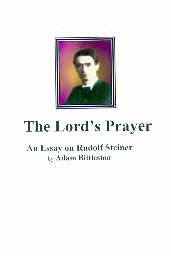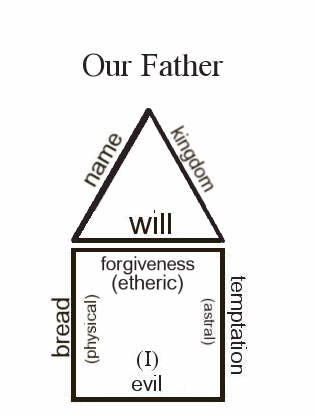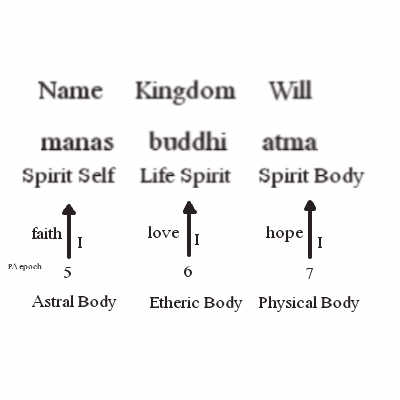The second of the square's petitions is to ask for forgiveness. To understand how this
business of trespassing and the subsequent forgiveness works, it helps me to think of a trespass as
putting a dent in another etheric body. When a portion of the etheric body is displaced from its
normal position in the physical body, we experience that condition as pain. When someone
trespasses on your land, they enter or pass through your propertied estate (secondary property)
without your permission. When someone takes your ideas and uses them without permission they
are trespassing on your primary property. Since we would not willingly allow someone to cause us
pain, any deed of another that causes us pain can be consider an unauthorized entry into our human
body (primordial property) and is thus also a trespass. In all three types of trespasses, against our
secondary, primary, or primordial property, we can feel a dent in our etheric body when we become
aware of the trespass. This can be considered as an operational definition of what a trespass is. It
allows us to consider any trespass on a process level.1
How might we understand the process of forgiveness of trespasses on a process level as
well? When someone puts a dent in our etheric body by trespassing on either our primordial,
primary, or secondary property, and then they subsequently recognize their deed as a trespass and
offer an apology and a restitution (if appropriate), the dent they made in our etheric body pops like
a dent in an automobile's fender in a body shop, and the pain we felt disappears at the same time.
Thus the passage "forgive us our trespasses as we forgive those who trespass against us" made be
understood to say, "allow the dents we made in others's etheric bodies to be released at the same
as we release the dents that others have made in our etheric body." Rightly understood there is a
magic quality to letting go of the dents in our etheric body inflicted by another's trespasses: it
undoes the dents we made in others's etheric bodies. If you have trouble understanding what is
meant by releasing a dent in your etheric body, consider the way you felt immediately before and
after you made a decision to forgive someone for a trespass against either your primordial property
(some personal slight or violence), your primary property (some unauthorized appropriation of your
thoughts or ideas), or your secondary property (some damage or theft to your auto, home, or
belongings). So long as you hold a grievance against the transgressor, you are maintaining a dent
in your etheric body. As soon as you release the grievance, not only are your personal dents
released, but those dents you have made in others's etheric bodies are released as well.
In the passage on forgiveness, Bittleston uses the metaphor of a "knot" instead of a "dent"
but the concept is similar. "Untie the knots we have made in others's etheric body as we untie the
knots that they have made in our etheric body."
[page 13, 14] FORGIVENESS
When we refuse to forgive, we set the barrier of our minds against this work
of Christ; we claim repayment in our way, in our time, instead of accepting the
healing of destinies through Him. We hold on to the knots in our etheric bodies,
instead of allowing them to be loosened.
When we achieve forgiveness, we are making use of the deepest essence of the
etheric body, its origin in cosmic Love. And we prepare ourselves to meet the
shining stream of Light, the heavenly power of forgiveness, which awakened
the soul of Paul on the road to Damascus.
In the third of the square petitions, we encounter the remarkable concept that "No temptation
is greater than God." After all if there is a friend upon whom we can depend to lead us out of any
maze, then there is no maze too difficult for this friend to solve. No matter how lost we seem to be,
we have only to call upon that friend and we will be led out of the maze. With a friend that we have
faith in, we can never fear to get lost in the most difficult maze. In the moment we ask to be led out
of the maze, the maze ceases to have power over us — we are like the former slave-trader who
wrote about his experiences in the song, Amazing Grace, "I once was lost, but now am found, twas
blind, but now I see." Yes, it is an amazing grace when we discover that no temptation is greater
than God.
[page 14] TEMPTATION
Endless questions and uncertainties surround to-day the sixth petition. How
is it possible that God should lead us into temptation? And is not temptation
the common lot of everyone, which we should not seek to escape?
To begin with, it is necessary to see exactly what "temptation" means. The
Greek word is peirasmos, which is related to our words "experiment" and
"experience"; it means a testing, a trying out. The same word is used to the
disciples at the tragic moment in Gethsemane when they are asked to remain
awake: "Pray that you may not enter into temptation." What sort of test is it,
before which the disciples may stand at that moment? It is the testing of their
faith; and this is the fundamental meaning of peirasmos for the early
Christians. In persecution, before the threats of the powers of this world,
before destinies which seem too hard to be borne, faith is tested; and the faith,
even of a Peter, can fail.
Here we are concerned with the basic quality of the astral body. What are more
generally described as temptations, the many wishes which beset us, have their
power because of the weakness of faith. "Your heavenly Father knows that you
have need of all these things "; the astral body that is filled with faith is able to
wait and trust.
For what then does the sixth petition ask? The same experience, which is for
one human being an agonising temptation, may be for another a grief patiently
accepted. The events that led up to the Crucifixion deeply troubled the faith of
the disciples, but there is no sign that for any moment the Mother of Jesus was
shaken in this way. When human beings can see the purpose of an event in the
light of eternity, however great their sorrow, their faith need not be affected at
all.
It would be great presumption to believe oneself able to meet all events in this
way; but we can pray for each other, that we may find a light upon our
destinies, which enables us to see enough of their meaning that we do not fall
into despair. The Greek of the sixth petition strongly emphasises into, the
direction in which the path grows continually darker. Pride inevitably leads us
in this direction — as Mary says: "He has scattered the proud in the imagination
of their hearts." The community of Christians humbly asks to be shown the
way which leads into light.
The words of the sixth petition may not seem to be saying this. Many would
prefer it if they stood in a positive form: lead us out of temptation. But that
they were originally given in the difficult form in which we know them is no
accident. Through the apparently negative words something immensely
positive is being said; that the soul of man will once more find the eternal light.
The words of St. Paul, after he had long pondered the Lord's Prayer, show that
this interpretation is seeking in the right direction: "Therefore let anyone who
thinks that he stands take heed lest he fall. No temptation has overtaken you
that is not common to man. God is faithful, and He will not let you be tempted
beyond your strength, but with the temptation will also provide the way of
escape, that you may be able to endure it." (I Corinthians, 10, 13.)
Since temptation yielded to leads us into sin, it would seem prima facie that fourth petition
of the square would be redundant, simply a re-stating of the third. But seen in the light of what
spiritual science reveals to us about the four bodies of the human being in this time, it is clear that
Temptation is related to the passions of the Astral Body which we as humans must learn to
overcome, and that Evil is related to the decisions which we make in freedom with our Ego Body
or "I". The "I" and Evil are inextricably intertwined — like they say about love and marriage, "you
can't have one without the other." The "Fall" of Adam and Eve when they ate from the "Tree of
Knowledge" was actually a "Leap" into freedom for all of humankind to come. We yet eat from the
tree that our first ancestors ate from, and the fruit of that tree is still freedom. Before Adam and Eve,
humans existed in complete harmony with the spiritual hierarchies — our will, our decisions were
at one with them. With our Leap into Freedom, it became possible for humans to make independent
decisions. With that independence came the possibility for things to exist that humans were not
ready for and thus the possibility came to be for evil to exist. Evil, according to Steiner, is, rightly
understood, a good out of its proper time. Like driving an automobile would be for a toddler or
driving a horse and buggy on a modern freeway — the former is a good before its time and the latter
a good after its time. Both are examples of activities have the possibility for what would be a good
in its proper time to become an evil when done out of its time. If one ponders the matter carefully,
every evil can be seen to be a good operating out of its time. With freedom, the possibility exists
for human beings to make decisions to bring evil into the world by performing good deeds out of
their time.
When we make the fourth petition of the square: "Deliver us from evil." we are in effect
asking for help in making decisions with our "I" that will be appropriate for the time in which we
live. Some of the bad decisions may stem from succumbing to temptation which, in the third
petition, we ask to led away from. Other decisions stem from a blatant decision made to acquire
some good that is not in its proper time for us in our lives and the lives of those we love and care
for. From those decisions we ask deliverance in this final petition of the Lord's Prayer. Below is
how Adam Bittleston wrote about the last petition in 1964:
[page 16, 17] EVIL
The last petition is related by Rudolf Steiner to the core of man, the "I am." It
is by the power of this central element within us that the other members of our
being may find their gradual purification; not that man's ego by itself can
accomplish this, but from this source the essential decision must come. In the
Gospels, the Christ asks again and again of human beings whom He is
prepared to heal, for their own consent and participation, their active will to
receive healing. Much is given indeed to those who receive it unconsciously, for
whom others may speak; but increasingly through all history decisions are
given into the hands of individual men.
It is possible for man to choose the work of destruction, rather than to act in
harmony with those beings to whom he owes his own origin. By making this
choice, he gives himself into the service of spirits who have already for long
ages worked as enemies of the Divine. Their intention is to make of man
something utterly different from that original heavenly purpose, to which the
fundamental structure of his physical body bears witness. "The evil" of which
the seventh petition speaks is a conscious alliance with the destroyer of
manhood, the being of whom Christ says, "he was a murderer from the
beginning."
It may seem as if evil of this kind was very remote from ordinary humanity.
But this is an illusion. Self-knowledge leads everyone to the insight that the
darkest evil is latent within him, and could come to expression. The decision to
follow the Christ does not in itself make this impossible; at the Last Supper,
when He speaks of the betrayer, the disciples have to ask, "Is it I? " Nevertheless, to ask for liberation from the evil is not to seek something which
cannot be given on earth. The "I" is endangered by evil because it is
incomplete; its emptinesses give the evil an opportunity. When it is truly filled
to overflowing from within, the destroyer can find in it no place. In St. John's
Gospel, this is shown in the description of the beloved disciple, whose head
rests on the breast of Jesus. He can ask about the betrayer, because evil has no
longer any hold upon him. Through his "I" there streams the fulness of the
spiritual Sun.
In summary, the Lord's Prayer or Our Father is composed of seven petitions, a set of three
followed by a set of four, as in the triangle placed over a square in Figure 1. The first three petitions
of the triangle bring to mind our future spiritualized astral, etheric, and physical bodies upon which
we will work during all of the remaining time of our Earth planetary embodiments. The four
petitions of the square represent our request for help for our four major human body components,
physical body, etheric body, astral body, and Ego body or "I". In the closing coda of the Lord's
Pray, "For the kingdom, the power, and the glory are Yours, forever and ever," we sing the praises
of the spiritual Beings of the 2nd and 1st hierarchies.
And so it is.


 existence and the second four with our life here on Earth. In each phrase below the key words are
in uppercase.
existence and the second four with our life here on Earth. In each phrase below the key words are
in uppercase.  epoch
epoch

